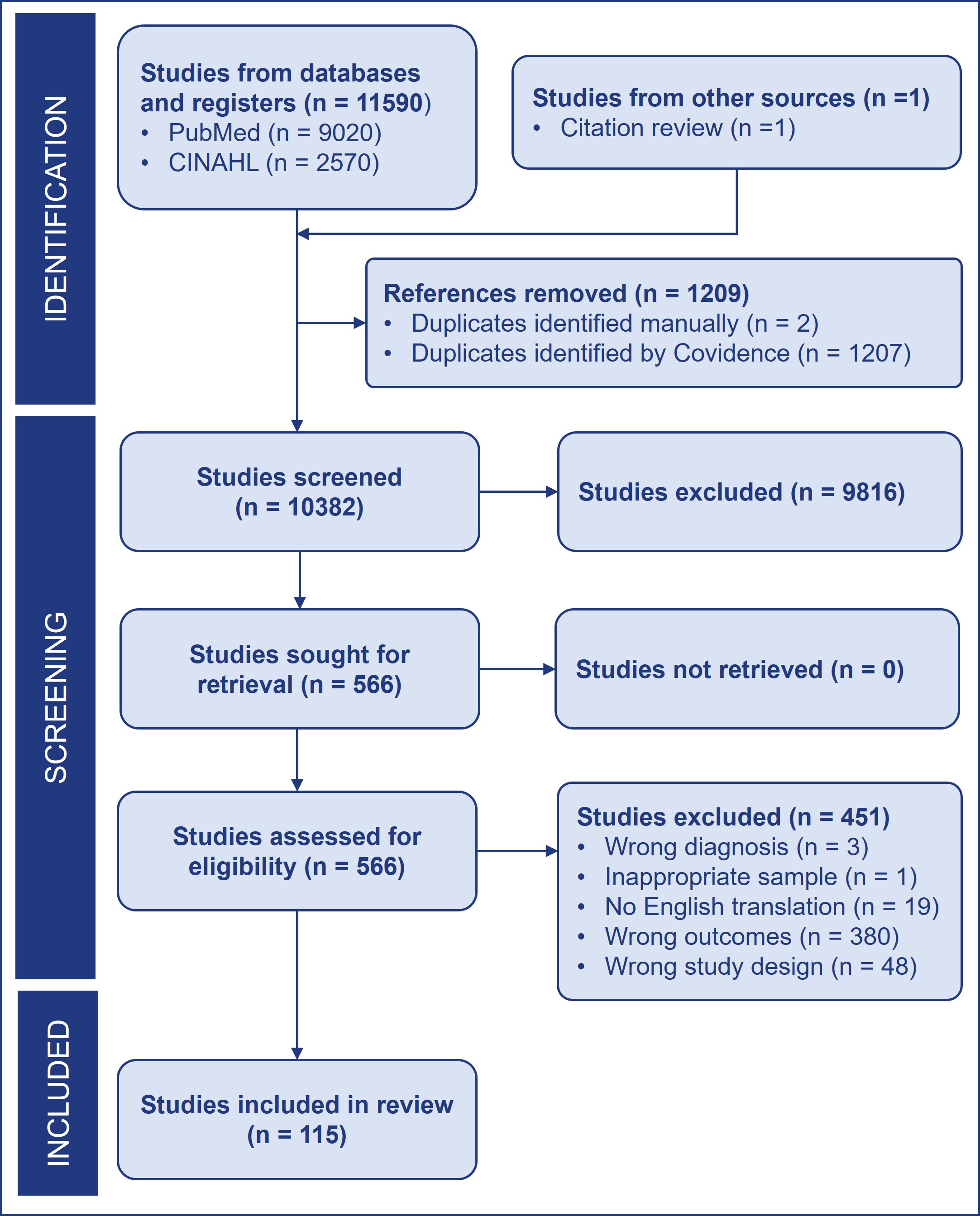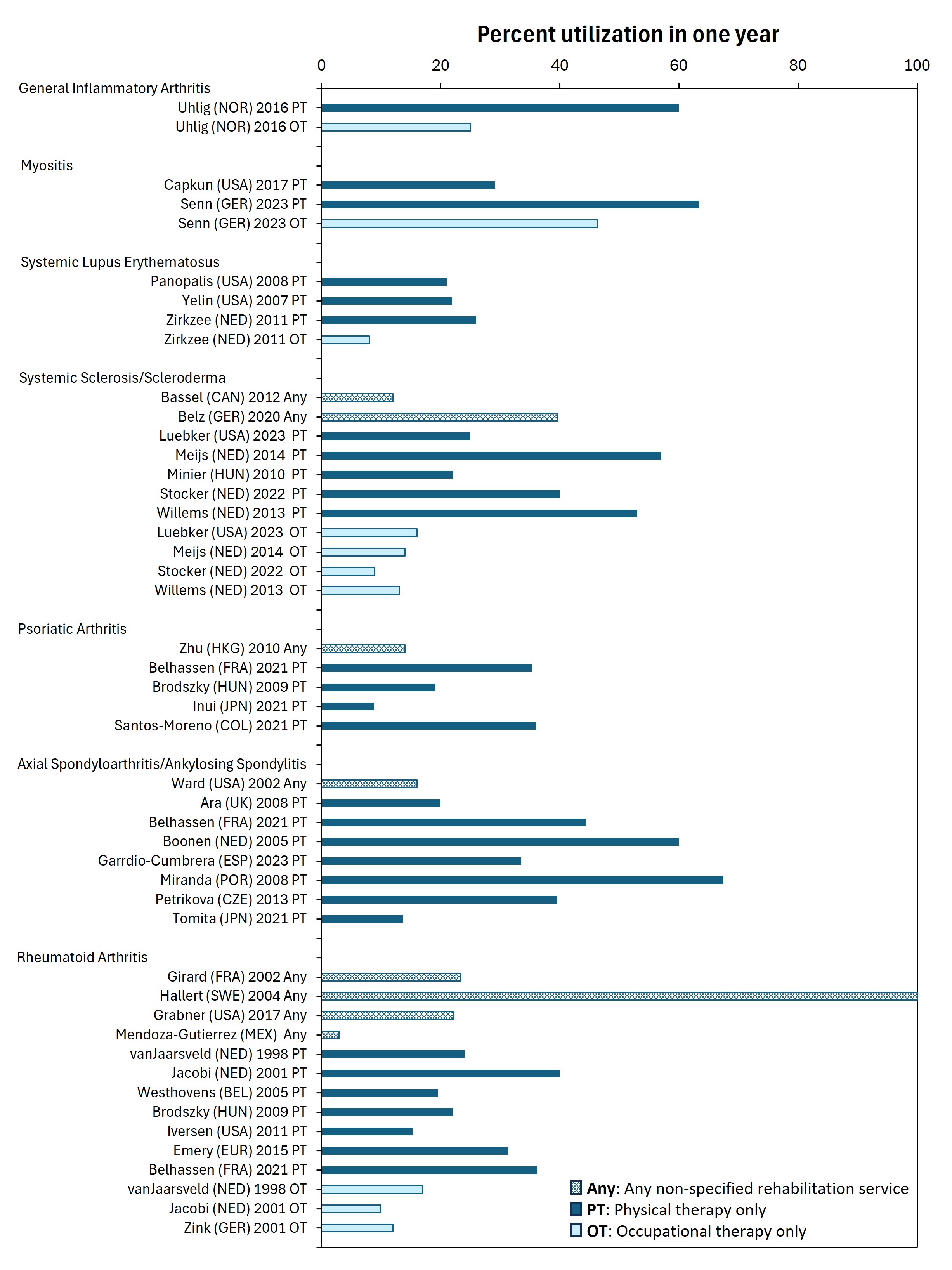Session Information
Session Type: Poster Session B
Session Time: 10:30AM-12:30PM
Background/Purpose: Rehabilitation services, such as physical therapy (PT) and occupational therapy (OT), are recommended in the care of inflammatory arthritis and other rheumatic conditions. However, the extent to which rehabilitation is utilized in rheumatology care is unclear. The aim of this systematic review was to determine the extent to which patients with common rheumatic conditions utilize rehabilitation services and explore what individual and contextual factors were associated with rehabilitation service utilization.
Methods: A protocol was developed and subsequently registered with PROSPERO (CRD42023492966). A systematic search of PubMed and CINAHL was performed. The search terms were utilized and combined terms for each rheumatic disease and rehabilitation services and utilization. Studies were included if they reported data on participants with a common rheumatic condition (i.e., axial spondyloarthritis/ankylosing spondylitis, psoriatic arthritis, rheumatoid arthritis, systemic lupus erythematosus, myositis, systemic sclerosis/scleroderma, or juvenile idiopathic arthritis) and reported the utilization of PT, OT, or non-specified rehabilitation services (e.g., allied health, combined PT/OT). Two reviewers independently screened each abstract and reviewed each full text for inclusion. A third reviewer resolved disagreements. Data were extracted from included studies by a single reviewer and confirmed by a second reviewer or study team consensus. Extracted data included percentage of the study sample who utilized rehabilitation services (PT, OT, non-specified rehabilitation service) and other sample/study characteristics (e.g. disease, time window of utilization, data collection period, and country). Factors associated with rehabilitation utilization were extracted, as available. The utilization percentages were summarized across sample/study characteristics.
Results: Of 10,382 references identified in the systematic searches, 115 studies met eligibility criteria (Figure 1). Most studies reported on patients with rheumatoid arthritis (n=61), axial spondyloarthritis (n=20), or systemic sclerosis (n=17). Rehabilitation utilization varied widely (range 0-100%) among studies across and within each disease, across time, and among countries. One year was the most common time window to evaluate rehabilitation utilization; Figure 2 presents data for the studies that reported rehabilitation utilization in a one-year time window. Female gender, functional limitation, and medication complexity (higher number and dosage) were consistently associated with increased rehabilitation utilization across multiple studies. In all longitudinal studies, annual rehabilitation utilization decreased over the studied period.
Conclusion: There was large variability in rehabilitation utilization rates across diseases, time, and countries, providing evidence for inconsistent integration of rehabilitation into routine rheumatology care. Future work should identify contemporary facilitators and barriers to appropriate rehabilitation utilization and develop systematic yet tailored approaches to optimize integration of rehabilitation services in rheumatology.
To cite this abstract in AMA style:
Geinosky K, Thompson J, Torrey J, Thoma L. Utilization of Rehabilitation Services in Patients with Common Rheumatic Conditions: A Systematic Review [abstract]. Arthritis Rheumatol. 2024; 76 (suppl 9). https://acrabstracts.org/abstract/utilization-of-rehabilitation-services-in-patients-with-common-rheumatic-conditions-a-systematic-review/. Accessed .« Back to ACR Convergence 2024
ACR Meeting Abstracts - https://acrabstracts.org/abstract/utilization-of-rehabilitation-services-in-patients-with-common-rheumatic-conditions-a-systematic-review/


